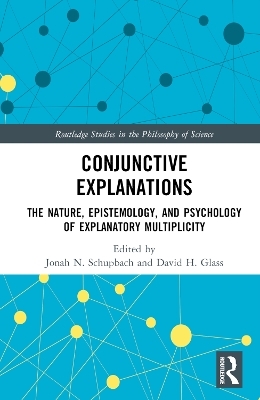
Conjunctive Explanations
Routledge (Verlag)
978-1-032-00677-2 (ISBN)
The book starts with an introductory chapter expounding the notion of conjunctive explanation and motivating a multifaceted approach to its study. The remaining chapters are divided into three parts. Part I includes chapters on “The Nature of Conjunctive Explanations.” Each chapter illustrates distinct ways in which explanatory multiplicity is motivated by a careful study of the nature and concept of explanation. The second part (“Reasoning About Conjunctive Explanations”) includes chapters on the epistemology and logic of conjunctive explanations. Here the contributors propose and evaluate various norms for reasoning correctly about and to conjunctive explanations. Part III concerns “The Psychology of Conjunctive Explanations,” with contributions discussing conditions under which humans entertain and hold multiple explanations of single explananda simultaneously and the cognitive limitations and capacities for doing so.
Conjunctive Explanations will be of interest to researchers and advanced students working on explanation in philosophy of science, epistemology, philosophical logic, and cognitive psychology.
Jonah N. Schupbach is an associate professor of philosophy at the University of Utah (USA), researching the nature, logic, and limitations of human reasoning. His recent publications include the 2018 BJPS Popper Prize-winning article, “Robustness Analysis as Explanatory Reasoning,” as well as the recent monograph Bayesianism and Scientific Reasoning (Cambridge, 2022). David H. Glass is a senior lecturer in the School of Computing at Ulster University (UK). His research lies at the intersection of computer science, mathematics, and philosophy of science, and includes recent publications on explanatory reasoning in the British Journal for the Philosophy of Science and International Journal of Approximate Reasoning.
Introduction Jonah N. Schupbach and David H. Glass Part 1: The Nature of Conjunctive Explanations 1. The Intricate Conjunction, Coexistence, Competition and Cooperation between Functional and Mechanistic Explanations Frank C. Keil 2. Multiple Patterns, Multiple Explanations Steve Petersen 3. Individual and Structural Explanation in Scientific and Folk Economics Samuel G. B. Johnson and Michiru Nagatsu Part 2: Reasoning about Conjunctive Explanations 4. The Role of Explanation in Epistemic Evaluation: Comparative vs. Non-Comparative Tomoji Shogenji 5. Conjunctive Explanations: A Coherentist Appraisal Stephan Hartmann and Borut Trpin 6. Conjunctive Explanation: Is the Explanatory Gain Worth the Cost? David H. Glass and Jonah N. Schupbach 7. On the Mutual Exclusivity of Competing Hypotheses Leah Henderson Part 3: The Psychology of Conjunctive Explanations 8. Best Explanations, Natural Concepts, and Optimal Design Igor Douven 9. Scientific and Religious Explanations, Together and Apart Telli Davoodi and Tania Lombrozo 10. When Competing Explanations Converge: Coronavirus as a Case Study for Why Scientific Explanations Coexist with Folk Explanations Andrew Shtulman
| Erscheinungsdatum | 29.04.2023 |
|---|---|
| Reihe/Serie | Routledge Studies in the Philosophy of Science |
| Zusatzinfo | 6 Tables, black and white; 15 Line drawings, black and white; 15 Illustrations, black and white |
| Verlagsort | London |
| Sprache | englisch |
| Maße | 152 x 229 mm |
| Gewicht | 480 g |
| Themenwelt | Geisteswissenschaften ► Philosophie ► Erkenntnistheorie / Wissenschaftstheorie |
| Geisteswissenschaften ► Psychologie ► Allgemeine Psychologie | |
| Naturwissenschaften | |
| ISBN-10 | 1-032-00677-3 / 1032006773 |
| ISBN-13 | 978-1-032-00677-2 / 9781032006772 |
| Zustand | Neuware |
| Informationen gemäß Produktsicherheitsverordnung (GPSR) | |
| Haben Sie eine Frage zum Produkt? |
aus dem Bereich

![Was heißt Denken?. Vorlesung Wintersemester 1951/52. [Was bedeutet das alles?] - Martin Heidegger](/media/113619842)
